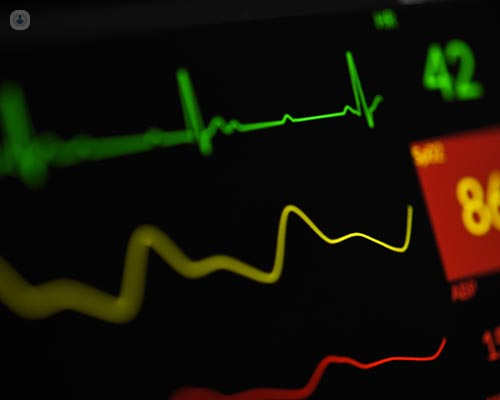An expert guide to palpitations: part 2
Escrito por:In the second article of a two-part series, esteemed consultant cardiologist Professor Peter Groves delves into which diagnostic tests can be recommended for heart palpitations.

What kind of diagnostic tests or procedures might be recommended to evaluate palpitations?
The first thing that a person suffering from palpitations should do is visit a cardiologist. The cardiologist will take the patient’s full medical history and they will have to undergo an examination in order to look for signs of associated heart disease.
A 12 lead electrocardiogram ECG is an essential first line of treatment. Even if the patient isn’t experiencing palpitations at the time of the ECG, they may be having some abnormalities in the electrical activity of the heart. This will appear on an ECG and give an indication as to whether there’s an underlying heart problem,
It is important to use establish an echocardiogram, in order to determine whether or not there is any problem with structural or functional abnormalities of any part of the heart. Structural abnormality of the heart makes it more likely that a palpitation is either clinically significant or even dangerous.
Additionally, patients should try to understand what’s happening within the heart at the time when the palpitations happen. In order to establish this, there are electrical tests that patients can undertake within the community. An example is an ambulatory ECG monitor, which is fitted to the chest wall of the patient. They can wear the monitor for normal everyday activities for a duration of 1 day, 2 days or even 7 days.
The monitor allows them to record electrical activity at a time when the patient may experience the symptoms.
They can make a record of the electrical activity so that later on, the doctor can retrospectively make an analysis of the recording to see what the electrical reading was at the time when they experienced that palpitation.
What are the latest devices available to track electrical activity?
A newer, popular device is the ZIO patch. It sits on the upper part of the arm and has strong adhesives which can sit there for two weeks, during which a patient can go back to their normal activities.
They can take exercise and shower, although they should not immerse the patch in the swimming pool. They can do normal things for a much longer period, which allows a much longer period of heart monitoring. At the end of the monitoring period, the patient takes off the patch, puts it in an envelope to be posted and the analysis can be done electronically at a distance.
We use a combination of these to identify if there is evidence of an underlying condition or structural or functional heart disease. If we find one of these conditions, we will do electrical tests to analyse the condition further.
We must assess the electrical activity at the time when patients experience symptoms and determine if we can categorise and identify exactly which type of heart rhythm disturbance it is. If it is a heart rhythm disturbance, we can reassure the patient about that.
When should someone with palpitations seek medical attention?
It is essential to look out for the following red-flag symptoms;
These include:
- History of palpitations and is experiencing dizziness or lightheadedness or blackouts.
- Chest pain.
- Breathlessness.
If they experience anything to indicate that the episodes may be dangerous or associated with underlying heart disease, the patient should most definitely seek the expertise of a cardiologist.
Even if patients aren’t experiencing those symptoms, I believe that they should seek help from a cardiologist. This is because if the symptoms of palpitations are frequent or interfere with daily existence and cause undue concern, stress or anxiety, that in itself can exacerbate, meaning that the patient can get into a vicious cycle if they’re becoming increasingly worried about palpitations.
To break the cycle of concern, having a cardiologist of expertise involved in investigating and managing the palpitations can take the worry away. I think the frequency, severity and how long the palpitations last, whether they are sustained or very short-lived, are the things that patients should take into account
Are there any lifestyle modifications or changes that can help prevent or reduce palpitations?
There are multiple lifestyle changes that we can make in order to improve our cardiac health. For example, if a patient is suffering from heart disease, they should try to improve their diet.
For patients with palpitations, we would discourage them from taking huge amounts of alcohol and excessive amounts of caffeinated drinks.
It is important to be careful about taking things in the diet that are likely to make the heart more excitable, such as anything in the diet that contains caffeine or is associated with high alcohol intake.
Switching to de-caffeinated drinks for a period of time, and taking water as your main source of fluid can help patients with palpitations and you should have a low-salt diet.
It is essential to stay fit and active, to ensure that your blood pressure is normal. This can be done with a blood pressure machine in the pharmacy or at the GP surgery. Having high blood pressure is certainly something which can increase the likelihood of palpitations.
Generally, lifestyle measures can be important, not just in modifying the symptoms of palpitations but also in keeping cardiovascular health as optimal as possible.
If you would like to book a consultation with Professor Groves, do not hesitate to book an appointment through his Top Doctors profile today.


